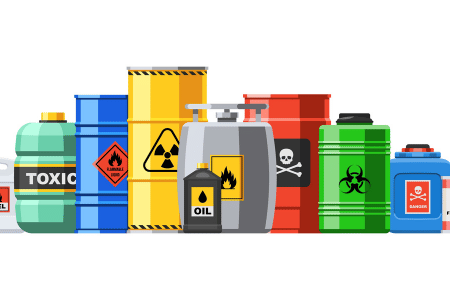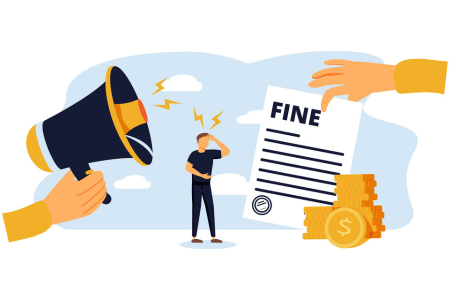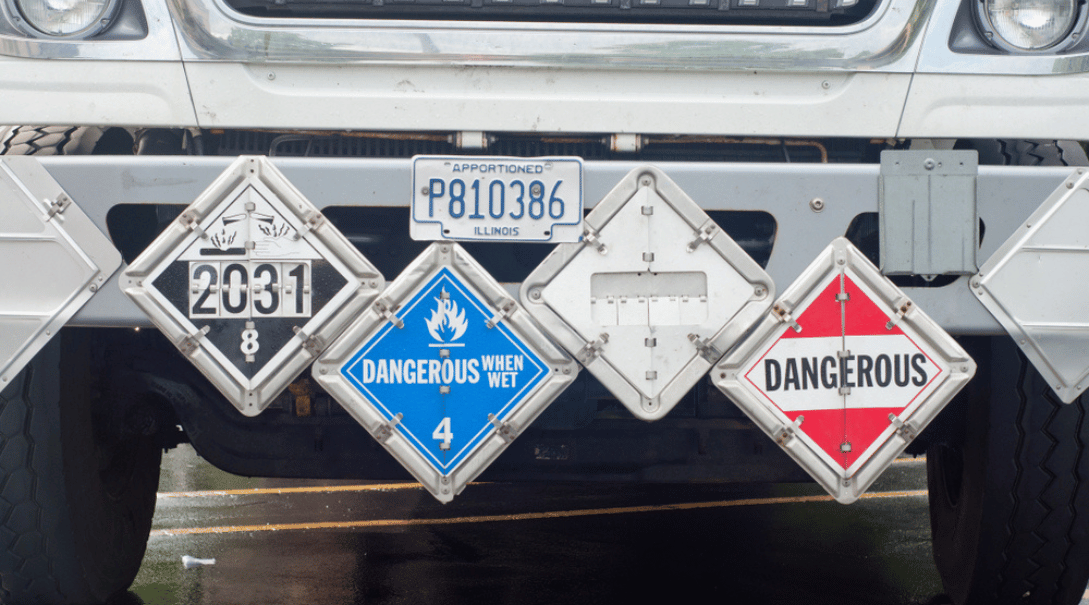In order to protect the environment and preserve public health, the Environmental Protection Agency (EPA) has developed stringent guidelines governing hazardous waste transportation. However, to provide an added layer of protection, state governments typically create their own set of hazardous waste transportation requirements. State-level regulations are often more rigorous than the EPA’s generalized requirements, and this is certainly the case in the Sunshine State.
The State of Florida’s Department of Environmental Protection (DEP) has developed extensive standards for hazardous and universal waste transporters. If your organization generates hazardous waste in Florida and needs to have it transported off-site, it is vital that you understand the DEP’s guidelines.
To that end, this post will examine the question, “How is hazardous waste transported in Florida?” It will also outline various transportation challenges and provide some guidance that you can use to prevent accidents and avoid fines.
Table of Contents
Navigating the Complex World of Hazardous Waste Transportation
Before explaining the “how” behind hazardous waste transportation, it will be useful first to examine why it’s important and shed light on the risks and responsibilities associated with this critical process.
Why Hazardous Waste Transportation Matters

That said, organizations can mitigate the negative impacts of hazardous waste production by ensuring that it is properly transported and disposed of. Once the hazardous waste is collected at the point of generation, transporters will shuttle it to a facility that can dispose of, store, treat, or recycle it.
Proper hazardous waste transportation strategies are critical for three key reasons.
First and foremost, correctly handling hazardous waste preserves public health and can prevent the waste from negatively impacting communities near the facility at which it was produced. Additionally, hazardous waste transportation protects the environment by preventing the contamination of waterways and soil through stormwater runoff or spills.
From a compliance perspective, the federal government and Florida’s regulatory authorities require that hazardous waste be properly transported and managed after production. Failing to do so can lead to fines and other serious penalties that threaten business continuity and erode profitability.
Understanding the Risks and Responsibilities
There are inherent risks associated with generating and transporting hazardous waste, which is why it is classified as a “hazardous” material.
The most obvious risk of transporting waste is the danger of a spill or leak. While certain accidents are unavoidable, your organization could still incur liability if you failed to develop a spill response plan or violated transportation requirements.
Behaving negligently in terms of hazardous waste transport can also expose your company to ongoing civil liability. Local community members could take legal action against your business, resulting in thousands of dollars in fines.
To insulate your business from these risks and fulfill your responsibility to the community, you must adhere to relevant hazardous waste transportation requirements, which means obtaining the proper permitting and licenses and providing your team with adequate training and ongoing guidance and support. If you decide to outsource hazardous waste transportation, make it a point to vet your partner to confirm they’re reliable.
How Is Hazardous Waste Transported? A Deep Dive Into the Process
Now that you understand some of the risks involved in hazardous waste transportation in Florida, it’s time to look at the various types of waste and the available transportation options.
Types of Hazardous Waste and Their Unique Challenges
The EPA has four lists that identify various types of hazardous waste. These are as follows:
- F-list
- K-list
- P-list
- U-list
Items on the F-list include wastes from “non-specific” sources. A few examples include:
- Solvent wastes
- Electroplating or other metal-finishing wastes
- Dioxin-bearing wastes
- Chlorinated aliphatic hydrocarbons
- Wood-preserving wastes
- Multisource leachate
- Petroleum refinery wastewater treatment sludges
Whereas F-list wastes can be produced from a multitude of different sectors, K-list substances can be traced back to specific manufacturing processes or industries. These source-specific wastes are generated by industries like:
- Organic chemical manufacturing
- Wood preservation
- Petroleum refining
- Pesticides manufacturing
- Inorganic pigment manufacturing
- Veterinary pharmaceuticals manufacturing
- Explosives manufacturing
- Inorganic chemicals manufacturing
- Primary aluminum production
- Iron and steel production
- Ink formulation
- Coking
- Secondary lead processing
The P and U-lists identify commercial-grade chemical products. If the waste contains any of the chemicals listed on either list, it’s classified as hazardous.
Transportation Methods: Trucks, Trains, and More
Hazardous waste is traditionally transported via truck and tanker trailer or train. However, it can also be transported via aircraft or ocean vessels.
Air transport allows expedited delivery to treatment or disposal facilities but is the most costly method. This technique is typically used for particularly concerning waste that must be disposed of quickly.
Ocean transport can be quite cost-effective, provided you are disposing of a large amount of waste. However, the waste will need to be transferred to a train or truck if the disposal facility is not located along a coastline.
Train transport offers a cost-efficient means of delivering a large volume of waste to a treatment facility. That said, train accidents involving hazardous waste can be catastrophic, as evidenced by recent events.
Truck transport offers a good balance of cost-effectiveness and safety. In the event of an accident, only one tanker’s worth of hazardous waste will be spilled. As such, managing the response and cleanup is far easier.
Truck transport is exceptionally safe and effective when you partner with an experienced hazardous waste transport partner like Alpha-Omega Training and Compliance. Our experienced, highly trained drivers and quality equipment enable us to do the job correctly every time.
Ensuring Safety During the Journey
Choosing a partner following established regulatory requirements is vital regardless of which hazardous waste transportation strategy you leverage. Additionally, you’ll want to ensure your transportation partner has the requisite equipment to safely and efficiently haul your waste.
When vetting your partner, ask about their experience hauling hazardous waste. Also, ask for proof that they are properly permitted. A reputable partner will respond to these inquiries promptly and with confidence.
Transport of Hazardous Waste Regulations: The Legal Framework
Familiarizing yourself with hazardous waste transport’s legal landscape is critical for compliance. Here is what you need to know.
Federal and State Laws Governing Hazardous Waste
The Federal Motor Carrier Safety Administration (FMCSA) regulates the transportation of hazardous waste. These regulations are outlined in 49 CFR Parts 100-185. The FMCSA’s regulations apply to the interstate and intrastate transport of hazardous material and to ocean vessels, motor vehicles, aircraft, and rail cars.
In addition to the FMCSA regulations, you will also need to familiarize yourself with the Florida Department of Environmental Protection’s requirements, which can be found in 40 CFR 263.
Among other things, this regulation requires transporters to obtain an ID number, use a manifest system, and demonstrate that they can clean up spills or discharges during transport.
Take the time to carefully review both state and federal laws before arranging the transport of hazardous waste.
Permits and Licenses: Ensuring Compliance
In Florida (and all other states, for that matter), you must obtain permits to generate, store, dispose of, or transport hazardous waste. The permitting process is relatively straightforward, and detailed checklists are available on the state’s website to assist you in gathering documents and completing forms.
In addition to permits, you will also need to ensure that drivers have the endorsements necessary to haul hazardous waste. For instance, commercial driver’s license (CDL) holders need a “hazmat” endorsement to transport hazardous materials. Your company could incur liability if a driver is stopped and lacks proper endorsements. This liability will be magnified if the driver is involved in an accident that leads to a spill.
Penalties for Non-Compliance: Staying on the Right Side of the Law

Parties that are found guilty of a civil violation can face a penalty of up to $75,000 per day for continued violation. The state may also revoke the violator’s hazardous waste permit.
If a violation constitutes a criminal offense, it will be classified as a felony of the third degree, which is punishable by up to five years in prison, a $50,000 fine, or a combination thereof.
As you can see, the penalties for non-compliance are severe. Therefore, it is imperative that you engage in responsible hazardous waste transportation practices.
Hazardous Waste Transportation Requirements: Meeting the Standards
While there are significant repercussions associated with non-compliance, the law is quite clear regarding your responsibilities during hazardous waste storage, production, and transport.
As such, you can effectively meet the standards and insulate yourself from liability with some due diligence. Specifically, you’ll need to address two factors, which are as follows.
Emergency Response Plans: Preparing for the Unexpected
Having an emergency response plan is a necessity when dealing with hazardous waste. No matter how skilled a driver may be, they can’t always predict or adapt to roadway conditions or the behavior of other vehicles on the road. Consequently, you must be prepared if an unforeseen event causes a spill or leak.
Putting together your own 24-hour emergency spill response team is a complex and resource-intensive endeavor. Fortunately, you can outsource this responsibility to AOTC.
Our comprehensive spill response services are available throughout the Sunshine State. If a spill occurs, we will be there to mitigate environmental damage and protect your reputation.
Training and Certification: Building a Skilled Workforce
A great plan is only half of the equation. You also need a talented, well-trained workforce that knows how to respond when the unexpected inevitably occurs. Creating a skilled workforce is an ongoing process that involves providing your team with recurring training opportunities and helping them obtain relevant certifications.
Building a skilled workforce takes time. But it is a worthwhile endeavor that will support the long-term growth of your business, help you preserve your brand image, and, most importantly, enable ongoing compliance with industry requirements.
The Benefits of Choosing Expert Services for Hazardous Waste Disposal
If you want to eliminate the hassle associated with hazardous waste disposal, consider partnering with an expert disposal services provider like AOTC. Our team has the experience, equipment, and expertise necessary to safely transport your hazardous waste and promote compliance. We also offer 24/7 spill response services.
Outsourcing hazardous waste management to a full-service transport and disposal firm is a great option when dealing with complex regulations, handling unique types of waste, or navigating environmental challenges.
By outsourcing, you can reduce waste management costs, prevent penalties, protect the environment, and promote business continuity.

